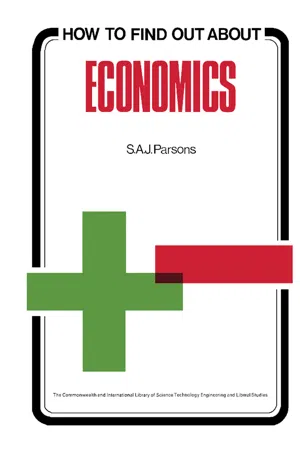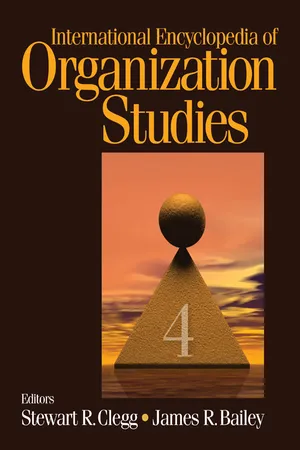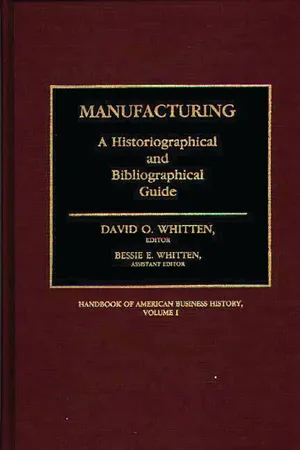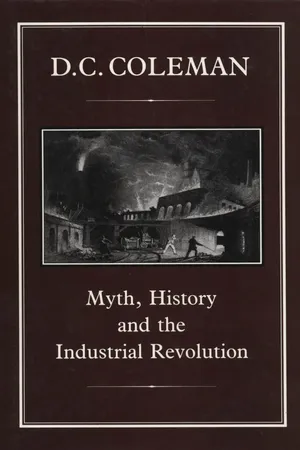History
American Business History
American Business History refers to the evolution of commerce and industry in the United States from colonial times to the present day. It encompasses the growth of small businesses, the rise of corporations, and the impact of technological advancements on the economy. The study of American Business History provides insights into the development of capitalism and the role of business in shaping American society.
Written by Perlego with AI-assistance
Related key terms
1 of 5
4 Key excerpts on "American Business History"
- eBook - PDF
How to Find Out About Economics
The Commonwealth and International Library: Libraries and Technical Information Division
- S. A. J. Parsons, G. Chandler(Authors)
- 2014(Publication Date)
- Pergamon(Publisher)
B U S I N E S S H I S T O R Y Business history is a branch of economic history which commenced as an academic study at the Graduate School of Business Administration of Harvard University. It is based primarily on records relating to persons who have identified themselves with private enterprise conducted for profit. The influence of business men who have successfully exploited products which have contributed to technological innovation has been far-reaching, leading to revolutionary changes in social habits, such as have been introduced by the invention, manufacture, and marketing of the motor-vehicle and the aeroplane. This supports the belief thai decisions freely made by individuals can result in determing the course of history. The basic need of the business historian is the provision of adequate written records. This is one reason why efforts are being made to encourage commercial and industrial concerns to preserve their business archives. Business history is an interesting study which, in addition to its affinity with applied economics, also requires the tools of other disciplines in the social sciences as well as, in many cases, some understanding of science and technology. Here again the business historian will benefit from the research techniques developed by economists. In general, studies are related to individuals, firms and business houses, large-scale enterprises, and industries as a whole. 130 HOW TO FIND OUT ABOUT ECONOMICS Periodicals There are two well-known periodicals dealing with business history. The first is The Business History Review which is published quarterly by the Harvard Graduate School of Business Administration (Editorial: 214-216 Baker Library, Soldiers Field, Boston, Mass. 01263, USA), first issued in 1926. It is an international journal and contains articles on business enterprise. It also investigates and analyses the interaction of business and its environment. - Stewart Clegg, James R. Bailey, Stewart R Clegg, James Bailey(Authors)
- 2007(Publication Date)
- SAGE Publications, Inc(Publisher)
Business history enters the 21st century in relatively robust shape, perhaps even more robust and more secure than its parent disciplines in economic history and economics. These conditions are thanks in no small part to its migration toward the business and management school. However, tensions are involved. Though business schools have proved willing to employ business historians, they seem much less willing to let them teach business history courses and modules, denying students full access to this fascinating field. In terms of research, the picture is more positive. The core business history journals are flourishing and are increasingly respected among other social scientists. The business school environment has also proved intellectually stimulating, seeding a process of cross-fertilization between business history and adjacent disciplines in both history and the social sciences. Nonetheless, business history must remain alert to the importance of making these moves on its own terms. Intellectually, business history faces a period, if not of conflict, then at least of challenge. It is incorporating new theoretical perspectives and beginning to pose itself new questions that are no longer concerned purely with those of performance and economic effi-ciency that dominated in the past. For some, success in these experiments will depend above all else on a restatement of business history practice as a con-sciously historical field of enquiry. In doing so, busi-ness history will maintain its ability to ask and answer the questions with which it has traditionally been con-cerned, and which remain important in themselves, while admitting the possibility of a greatly expanded pool of themes and styles. —Andrew Popp See also International Management; Organizational Economics; Organizational Structure; Organization Theory, Historical Analysis Further Readings Amatori, F., & Jones, G.- eBook - PDF
Manufacturing
A Historiographical and Bibliographical Guide
- David O. Whitten, Bessie E. Whitten, David O. Whitten, Bessie E. Whitten(Authors)
- 1990(Publication Date)
- Greenwood(Publisher)
Business historians for years relied on Larson's Guide to Business History (1948), which was updated by Lorna M. Daniells, Studies in Enterprise: A Selected Bibliography of American and Canadian Company Histories and Biographies of Businessmen (1957). Annual supplements to this volume appeared in Business History Review issues each summer 1959—62 and in the fall of 1963 and 1964. In 1971 Robert W. Lovett published American Economic and Business History Information Sources. At the close of 1987, the Center for the History of Business, Technology, and Society, at the Hagley Museum and Library, Wilmington, Delaware, became the American participant in an international venture to create a bibliography of business history. Business History Review, the antecedents of which date back to 1926, is the journal of the discipline. Business and Economic History is issued an- nually covering the proceedings of the Business History Conference, the professional society of American business historians. The Economic and Business Historical Society publishes an annual volume entitled Essays in Economic and Business History. Business History, the British journal of business historians, often carries articles useful for American business his- torians. Beginning in January, 1974, the Japanese have had once-a-year confer- ences on comparative business history, held at the Fuji Education Center, 4 Manufacturing Susono, Shizuoka; American business historians have participated, and the proceedings of each conference have been published (in English) by the University of Tokyo Press. These conferences have assisted business histo- rians in placing American Business History in an international context. While many have been industry-specific, some have been more general, for ex- ample, the first one on business strategy and structure (Nakagawa [1976]) and the most recent one on foreign business (including American business) in Japan (Yuzawa and Udagawa, forthcoming 1990). - eBook - PDF
- D. C. Coleman(Author)
- 1992(Publication Date)
- Hambledon Continuum(Publisher)
10 The Uses and Abuses of Business History A promotional document for the Business History Unit, dated May 1977 contained this nicely balanced sentence: 'Company history is to business history as personal biography and individual monographs are to political history'. 1 It went on to announce that the time had arrived to move on from company history to 'wider conceptual studies'. Two years later, by which time the Unit had been set up and its Director appointed, its first annual report, of August 1979, echoed this message by stating that the Unit emphasized 'the wider aspects of the subject, building on the history of individual companies and encompassing business as a whole'. 2 This statement was repeated as a sort of leitmotiv in all the Unit's * The establishment of business history as an academic subject is hardly imaginable without the Industrial Revolution and its historiography, whatever the antiquity of the genus business-man. In Britain, its relationship to economic history, to economics, and to business studies is still in a confused and shifting state. Some professional historians had some initial success in wresting the writing of commissioned company histories from the hands of the hacks but then they were confronted with a special case of the gulf between professional and lay. This was that the resulting works were largely regarded as not for reading but simply for existing: they were seen as public relations objects. The myth-consuming public wanted heroes or villains, not analysis of past costs and profits; the former doings of particular companies were not seen by economists as appropriate theory-fodder; orthodox historians looked upon such commis-sioned works with lofty disapproval; neither the advocates of business studies nor most businessmen saw such company histories, however scholarly, as aids in tackling the problems of today and tomorrow.
Index pages curate the most relevant extracts from our library of academic textbooks. They’ve been created using an in-house natural language model (NLM), each adding context and meaning to key research topics.



